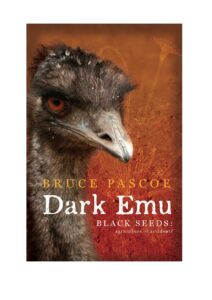 I enjoyed reading Bruce Pascoe’s Dark Emu — drawing on Australia’s early explorer diaries to portray Australia’s Aborigines as living in “villages” of huts and practising agriculture and aquaculture — but with some caveats. I found myself constantly adjusting what he was depicting with what I already knew to be true so that I came away not with a totally new understanding but a revised one. I could not accept on the basis of the argument he presented that Aborigines practised democracy or that they lived as settled farmers. I have heard and seen too much from “primary sources” to dismiss the notion that they were also hunters and gatherers. Besides, I found myself wondering, why is it so important to stress agriculture as an indicator of civilizational advance? Sure, agriculture was important in our tradition, but is it really a universal marker of progress? Progress towards what? I have been fascinated with the Aboriginal concepts of the Dreaming or the Dreamtime. Even in Dark Emu one reads little reminders that technologies practised by Aborigines were performed with a cultic or Dreamtime mythological association or impulse.
I enjoyed reading Bruce Pascoe’s Dark Emu — drawing on Australia’s early explorer diaries to portray Australia’s Aborigines as living in “villages” of huts and practising agriculture and aquaculture — but with some caveats. I found myself constantly adjusting what he was depicting with what I already knew to be true so that I came away not with a totally new understanding but a revised one. I could not accept on the basis of the argument he presented that Aborigines practised democracy or that they lived as settled farmers. I have heard and seen too much from “primary sources” to dismiss the notion that they were also hunters and gatherers. Besides, I found myself wondering, why is it so important to stress agriculture as an indicator of civilizational advance? Sure, agriculture was important in our tradition, but is it really a universal marker of progress? Progress towards what? I have been fascinated with the Aboriginal concepts of the Dreaming or the Dreamtime. Even in Dark Emu one reads little reminders that technologies practised by Aborigines were performed with a cultic or Dreamtime mythological association or impulse.
Now a new volume has been released that I think will restore some balance to Dark Emu‘s image of the First Australians. Others have commended Pascoe for popularizing views of Aborigines that have long been known among specialists and experts. It would be a mistake, however, to replace the hunter-gatherer view with a settler-farmer construct. So we now have Peter Sutton and Keryn Walshe’s Farmers or Hunter-Gatherers? The Dark Emu Debate. I have only begun to read it but already a couple of sections can be quoted:
Pascoe contradicts the false belief, perhaps held by some, that all Aboriginal people were naked all of the time. Some Aboriginal people sewed animal skins into cloaks (page 89).
He criticises the uninformed view that classical Aboriginal society consisted of constantly nomadic people who simply lived off nature’s bounty, were not ecological agents, did not stay in one place for more than a few days and did not store resources (for example, page 12).
And he gives considerable attention to the storage of foods (pages 105—14), this being a useful corrective to ignorance of Aboriginal storage methods.
(Sutton, p. 5)
And in particular:
Pascoe’s message is built on a simple distinction between what he calls ‘mere’ hunter-gatherers, on the one hand, and farmers; or between ‘mere’ hunting and gathering on one hand and ‘agriculture’ on the other. We consider that the evidence, in fact, reveals a positioning of the Aboriginal people of 1788 somewhere between these two extremes: they were complex hunter-gatherers, not simple farmers. The Old People in 1788 had developed ways of managing and benefiting from their landscape that went beyond just hunting and just gathering but did not involve gardening or farming. They were ecological agents who worked with the environment, rather than, usually, against it. They frequently used slow-burning fires to make their landscapes more liveable. However, they did not cut down bush to clear the land, plough and hoe the soil in preparation for planting, or then sow stored seed or tubers or rootstock in gardens or in fields.
(p. 7)
For the Andrew Bolts who have savaged Dark Emu as “a hoax” whose purpose is supposedly to accuse white settlers of ignorant and cruel treatment of the first inhabitants here, I further note that Sutton and Walshe share Pascoe’s assessment that white occupation is more accurately described as a “conquest” of the land and not at all “the first settlement”.
Sutton, Peter, and Keryn Walshe. Farmers or Hunter-Gatherers?: The Dark Emu Debate. Melbourne University Press, 2021.
Pascoe, Bruce. Dark Emu. Black Seeds : Agriculture Or Accident? Broome, Western Australia: Magabala Books, 2014.
